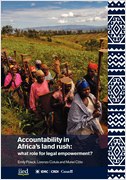Focal point
Location
Mission
Our mission is to build a fairer, more sustainable world, using evidence, action and influence in partnership with others.
Who we are
IIED is one of the world’s most influential international development and environment policy research organisations. Founded in 1971 by economist Barbara Ward, who forged the concept and cause of sustainable development, we work with partners on five continents. We build bridges between policy and practice, rich and poor communities, the government and private sector, and across diverse interest groups. We contribute to many international policy processes and frameworks, including the Intergovernmental Panel on Climate Change, the Millennium Ecosystem Assessment and the UN conventions on climate change and biological diversity.
What we do
IIED carries out research, advice and advocacy work. We carry out action research — generating robust evidence and know-how that is informed by a practical perspective acquired through hands-on research with grassroots partners — and we publish in journals and maintain high research standards. We advise government, business and development agencies, and we argue for changes in public policy. We focus on bottom-up solutions, stay open to flexible, adaptable solutions and are marked by a tradition of challenging conventional wisdom through original thinking.
Resources
Displaying 251 - 255 of 367Markets for the many rather than the few
A development policy opting exclusively for value chain development and the integration of producers in modern markets overlooks the reality for the majority of smallholders, our author maintains. Policy should pay greater attention to addressing the area most small-scale producers are active in: the informal sector.
Tracking Adaptation and Measuring Development (TAMD) in Mozambique
Mozambique is the 8th most vulnerable country to climate change and is one of the poorest countries in the world with a high dependency on foreign aid. The population is primarily rural and dependent on agriculture, with 60% living on the coastline. Droughts, flooding and cyclones affect particular regions of the country and these are projected to increase in frequency and severity.
Accountability in Africa’s land rush: what role for legal empowerment?
Includes setting the scene: accountability in large-scale land acquisitions; the role of the law in shaping pathways to accountability; citizen action – how effective are the bottom-up checks and balances?; under what conditions can citizens achieve justice and equitable outcomes in relation to land acquisitions?; what role for research?
Media perceptions and portrayals of pastoralists in Kenya, India and China
Through the analysis of newspaper articles and a survey of journalists, this publication identifies gaps and highlights differences in how the media portray pastoralism in Kenya, China and India. In discussing their methodology, the authors note that their reliance on national, English-language publications meant that they were not able to include data from vernacular language press in pastoral regions.Although able to make significant contributions to food security, livelihoods and economic prosperity, the benefits of pastoralism often go unnoticed.
Accountability in Africa’s land rush: what role for legal empowerment?
Commercial interest in land has been increasing in recent years. While the trend is global, Africa has been centre stage to this new wave of land acquisitions. Agricultural investments can contribute to economic development and poverty reduction. But evidence suggests that many investments have failed to live up to expectations. In many cases, the deals have left villagers worse off than they would have been without the investment. Many deals are happening in developing countries where food security challenges are acute, and land tenure systems insecure.








